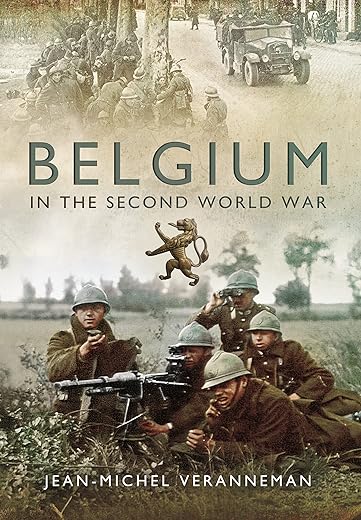Belgium in the Second World War
£12.60£14.20 (-11%)
When the Nazis invaded neutral Belgium in May 1940, defeat and occupation were inevitable but Belgian armed forces held out against a vastly superior enemy for 18 days. The elected Government went into exile in London but King Leopold III controversially remained with his people as a prisoner. As described in this authoritative book, Belgians continued the fight both outside and inside their country. There were eventually two complete Belgian RAF squadrons. The Colonial Army defeated the Italians in East Africa and the Belgian Brigade fought from Normandy to Germany. The Belgian Resistance organized escape routes, sabotaged their occupiers activities and spied for the Allies. 17,000 died or were executed and a further 27,000 survived detention. Meanwhile others collaborated and fought for the Nazis and large numbers were tried post-war for war crimes and treason. About half the Jews in Belgium in 1940 died in the Holocaust and there are many stirring stories of courage, as well as tragic ones. This is an overdue and honest account of one Nations very varied experiences during five years of Nazi occupation and oppression.
Read more
Additional information
| Publisher | Pen & Sword Military (8 Nov. 2021) |
|---|---|
| Language | English |
| Paperback | 224 pages |
| ISBN-10 | 1399011413 |
| ISBN-13 | 978-1399011419 |
| Dimensions | 15.49 x 2.03 x 23.11 cm |










by Retsoc
Good read and excellent account on Belgium during the Second World War. One really needs to read this book first before setting off on saying anything about the events of May 1940 in Belgium. I’d wish there were several little books with detailed accounts on various largely unknown battles during the eightteen days of fighting. There wasn’t only Eben Emael, but there was also a significant battle near Antwerp with the small groups of Belgian armour, the battle of the Lys with the Chasseurs Ardennais showing their teeth once more, etc. After that last battle the Germans actually began taking some dreadful reprisals. The myth goes that the Chasseurs were fighting in shirt sleeves because of the heat and the Germans mistook them for armed civilians. In the end the Belgian army lost more soldiers in the one campaign than during what remained of the First World War after the army’s legendary retreat behind the Yser River. Those losses and the German reprisals against civilians were no doubt deciding factors in the ultimate decision to just fight on till the Dunkirk beachhead was secured. Perhaps the old military order after a lost battle of Sauve Qui Peut to the Belgian Army would have been better then, but that’s my personal view and a clear afterthought. Long live the King and Belgian democracy!
by The Wargamorium
A small book with some very interesting facts and figures and the only book in English I am aware of that covers Belgium’s WW2 experience. I have to say however that the details were glossed over in some places and laboured in others. Nonetheless it is a good book and recommended for those with an interest in this subject.
by Amazon Customer
Have really enjoyed reading Belgium in World War Two. A well
written balanced view of events which has filled in lots of little gaps
in my knowledge and illuminated a whole area of the war which tends to
have been over looked or remains just a foot note to the larger
picture. I thought the way his family history was woven into the story was
excellent, and left me wanting to know more. I do hope he writes one on 1914-18.
The book is so thorough the threads are already there for a prequel.
by AJ
I found this to be informative and balanced particularly bearing in mind the delicate nature of Belgian politics and schisms that still very much exist today. It filled in a lot of blanks in my family history.
by A Reader
This book provides an interesting, well-researched account of how the Second World War affected Belgium. After setting the scene with a discussion of Belgium in the inter-war period, the author describes the efforts of the Belgian Army to resist the German invasion in 1940, the decision to surrender, and resistance and collaboration during the German occupation. Despite the political sensitivity of these topics, the author’s approach remains admirably objective throughout. It would have been interesting to see certain aspects explored in more detail, but on the whole this is a comprehensive and well-written account.